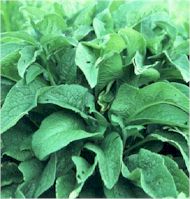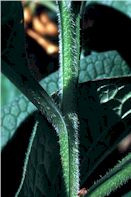 |
The Comfrey of our river banks, and moist watery places, is the Consound, or Knit-back, or Bone-set, and Blackwort of country folk; and the old Symphytum of Dioscorides. It has derived these names from the consolidating and vulnerary qualities attributed to the plant, from confirmo, to strengthen together, or the French, comfrie. This herb is of the Borage tribe, and is conspicuous by its height of from one to two feet, its large rough leaves,
which provoke itching when handled, and its drooping white or purple flowers growing on short stalks. Chemically, the most important part of the plant is its "mucilage." This contains tannin, asparagin, sugar, and starch granules. The roots are sweet, sticky, and without any odour. "Quia tanta |
proestantia est," says Pliny, "ut si carnes duroe coquuntur conglutinet addita; unde nomen!" "and the roots be so glutinative that they will solder or glew together meat that is chopt in pieces, seething in a pot, and make it into one lump: the same bruysed, and lay'd in the manner of a plaister, doth heale all fresh and green wounds." These roots are very brittle, and the least bit of them will start growing afresh.
The whole plant, beaten to a cataplasm, and applied hot as a poultice, has always been deemed excellent for soothing pain in any tender, inflamed or suppurating part. It was formerly applied to raw indolent ulcers as a glutinous astringent, and most useful vulnerary. Pauli recommended it for broken bones, and externally for wounds of the nerves, tendons, and arteries. More recently surgeons have declared that the powdered root (which, when broken, is white within, and full of
a slimy juice), if dissolved in water to a mucilage, is far from contemptible for bleedings, fractures, and luxations, whilst it hastens the callus of bones under repair. Its strong decoction has been found very useful in Germany for tanning leather. The leaves were formerly employed for giving a flavor to cakes and panada.
A modern medicinal tincture (H.) is made from the root-stock with spirit of wine; and ten drops of this should be taken three or four times a day with a tablespoonful of cold water. French nurses treat cracked nipples by applying a hollow section of the fresh root over the sore caruncle; and a decoction of the root made by boiling from two to four drachms in a pint of water, is given for bleedings from the lungs or bladder.
The name Consound, owned by the Common Comfrey, was given likewise to the daisy and the bugle, in the middle ages. "It joyeth," says Gerard, "in watery ditches, in fat and fruitful meadows." A solve concocted from the fresh herb will certainly tend to promote the healing of bruised and broken parts, suggesting as an appropriate motto for the salve box: "Behold how good and pleasant a thing it is to dwell together in unity! It is like the precious ointment which ran
down Aaron's beard." Some foreknowledge of the Comfrey perhaps inspired the Prophet Isaiah to predict that after a time "the heart should rejoice and the bones flourish like a herb." The Poet Laureate tells of:
"This, the Consound,
Whereby the lungs are eased of their grief."
 |
About a century ago, the Prickly Comfrey a variety of our Consound was naturalized in this country from the Caucasus, and has since proved itself amazingly productive to farmers, as, when cultivated, it will grow six crops in the year; and the plant is both preventive and curative of foot and mouth disease in cattle. It bears flowers of a rich blue color.
From our Common Comfrey a sort of glue is got in Angora, which is used for spinning the famous fleeces of that country. Mr. Cockayne relates that the locksman at Teddington informed him how the bone of his little finger being broken, was grinding and grunching so sadly for two months, that sometimes he felt quite wrong in his head. |
One day he saw a doctor go by, and told him about the distress. The doctor said: "You see that Comfrey growing there? Take a piece of its root, and champ it, and put it about your finger, and wrap it up." The man did so, and in four days his finger was well.
Herb Simples
The Primitive Simplers presented here show the way of life in other generations, it is not suggested or recommended trying them yourself. |
|
Garden
Herbs
Home
History of Herbs
Herb Gardening
Herbs for Beginners
Drying & Preserving Herbs
Indoor Herb Gardening
Herb Garden
Hints & Tips
Herbal
Cooking
Herb Chart
Using Herbs
Culinary Herbs
Herb
Oil and Vinegar
Herb Teas
Herb Candy
Herb Jelly
Herb Simples
Preface
Introduction
Alphabetical Listing

Trade
Recipes Online
Share your Recipes with others!!
|



